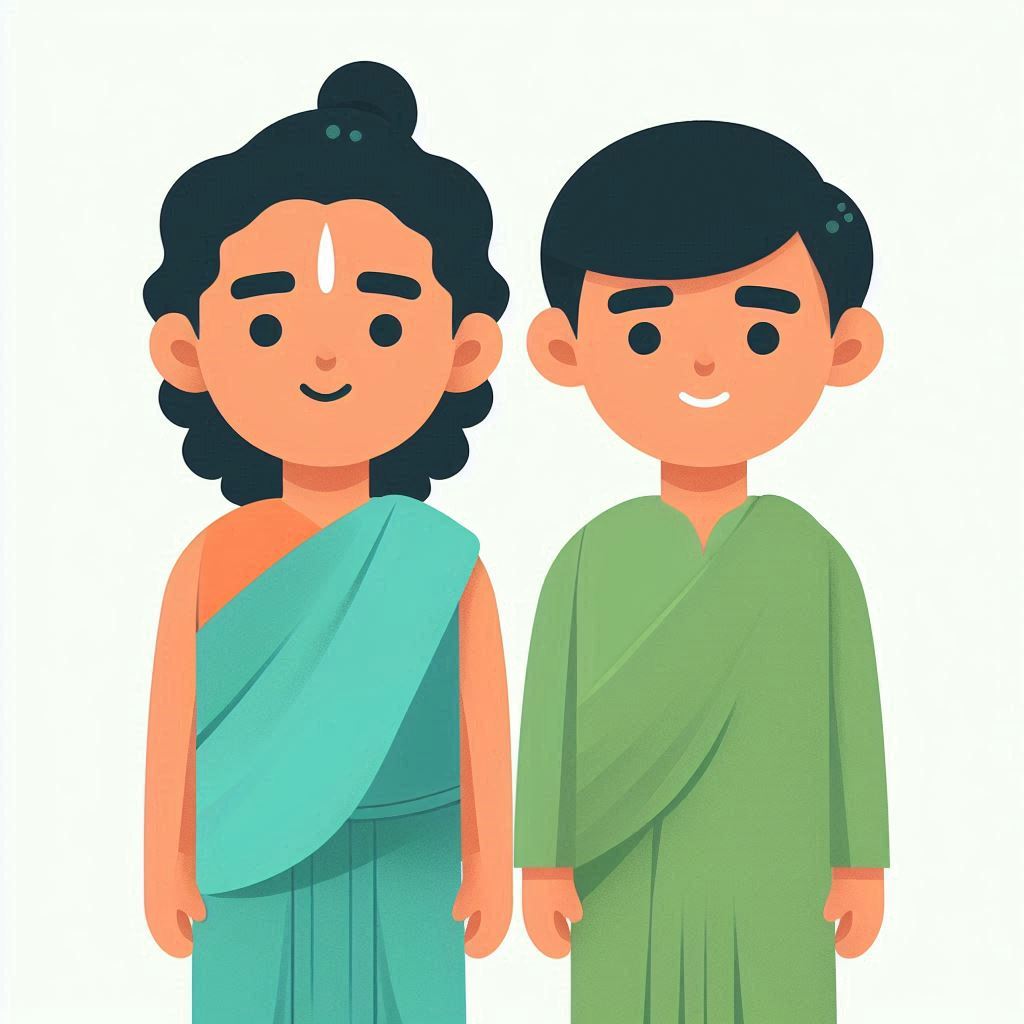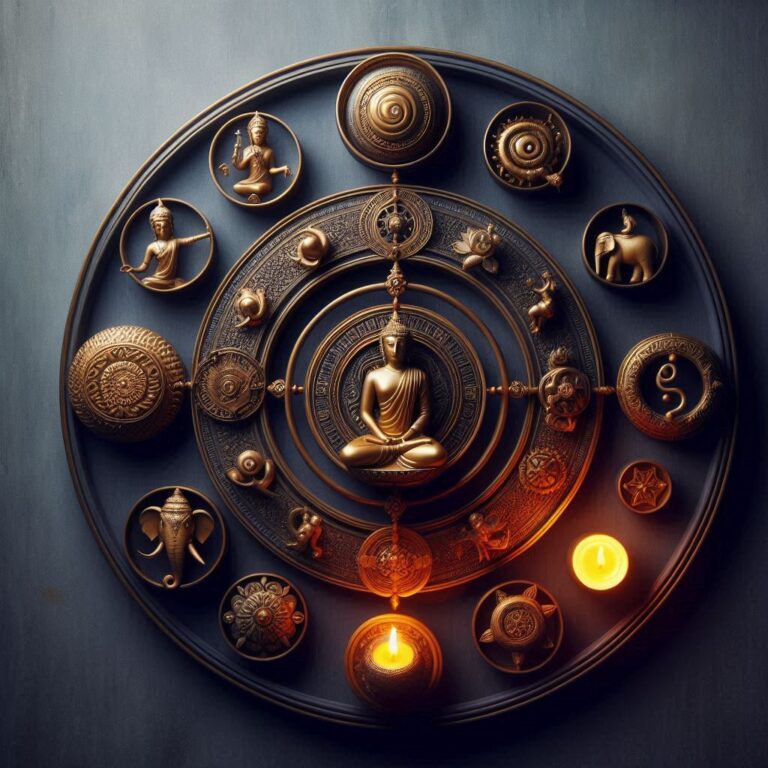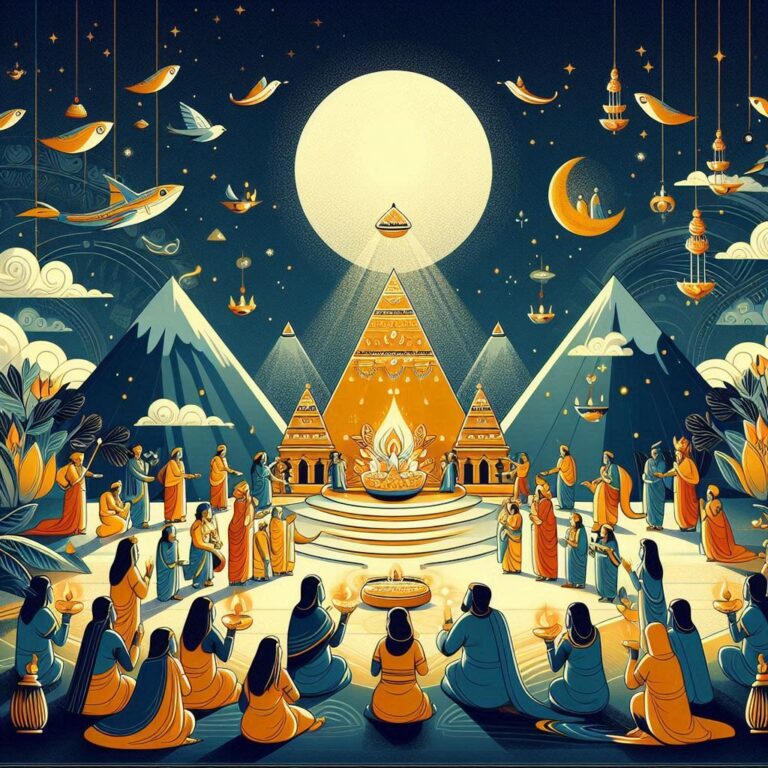The Birth of Bharata – Bharata’s Birth and His Significance
Introduction
The Ramayana, an epic that resonates with devotion, duty, and sacrifice, introduces several heroic figures, one of whom is Bharata, the virtuous brother of Lord Rama. While much of the narrative focuses on Rama, Bharata’s significance cannot be overstated. His birth marks a pivotal moment in the lineage of the Raghu dynasty, and his life is a testament to the strength of familial duty and loyalty.
The Raghu Dynasty’s Legacy
The Raghu dynasty is renowned for its valor, righteousness, and deep-rooted cultural values. It was ruled by kings who upheld dharma above all else. King Dasharatha, Bharata’s father, was the proud ruler of this illustrious dynasty. His reign was peaceful and prosperous, but the absence of an heir cast a shadow over his kingdom. The dynasty’s future depended on the birth of sons who would continue the legacy.
Dasharatha’s Desire for Sons
King Dasharatha’s longing for an heir was not just a personal desire but a royal duty. Without a son to carry forward the dynasty, Ayodhya’s future was uncertain. This led Dasharatha to perform two important yajnas: the Ashwamedha Yajna and the Putrakameshti Yajna. These sacred rituals were believed to invoke divine blessings for the birth of sons.
Invocation of the Divine
During the Putrakameshti Yajna, a divine being arose from the sacred fire and presented a bowl of divine kheer (pudding) to Dasharatha. This offering was to be shared among his queens. Each queen partook of the divine offering, and soon, the blessings of the gods manifested in the birth of four sons: Rama, Bharata, Lakshmana, and Shatrughna.
Bharata’s Birth
Bharata was born to Queen Kaikeyi, Dasharatha’s favorite wife. The name “Bharata” means “to be maintained,” and it reflects his role as the one who would uphold and sustain the values of his dynasty. Bharata was born with divine qualities, gifted by the gods, and his birth was celebrated throughout the kingdom of Ayodhya.
Bharata in Comparison with Rama
Though Rama was the eldest and the most revered, Bharata had his own unique qualities that made him stand apart. He was deeply affectionate, humble, and selfless. Bharata’s love for his elder brother Rama was unmatched, and their relationship was one of mutual respect and adoration. Unlike typical sibling rivalries, Bharata’s loyalty towards Rama remained unwavering, even in the most testing times.
Bharata’s Dharma
Bharata’s sense of duty, or dharma, became his defining trait. When he learned that his mother Kaikeyi had wrongfully exiled Rama to ensure his ascension to the throne, Bharata was filled with remorse. He could not bear the idea of ruling Ayodhya in Rama’s absence. His adherence to dharma led him to reject the throne and instead, he took Rama’s sandals as a symbol of authority, ruling the kingdom in Rama’s name.
The Yajna and Divine Blessing
The yajnas performed by King Dasharatha were not merely rituals; they were imbued with divine blessings. Sage Vashishta, the royal priest, played a pivotal role in ensuring the success of these yajnas. His guidance was instrumental in the birth of the four brothers, who would each play crucial roles in the Ramayana’s unfolding events.
Kaikeyi’s Importance
Queen Kaikeyi was known for her strength and influence over King Dasharatha. Her love for Bharata was profound, and she sought to secure his future at all costs, even if it meant the exile of Rama. However, Bharata’s righteous nature led him to reject her machinations, showcasing his noble heart.
Bharata’s Relationship with Shatrughna
Bharata shared a close bond with his younger brother Shatrughna. They were inseparable, and their relationship was marked by mutual respect and devotion. Shatrughna often accompanied Bharata, supporting him in both personal and royal matters.
Bharata’s Exile
When Rama was sent into exile, Bharata was away. Upon his return, he was devastated to learn of the events that had transpired. His mother’s actions brought him no joy, and he immediately set out to bring Rama back from the forest. This act of selflessness and devotion to his elder brother is one of the most powerful moments in the Ramayana.
Bharata’s Governance of Ayodhya
In Rama’s absence, Bharata took on the role of caretaker of Ayodhya. However, he refused to sit on the throne and instead placed Rama’s sandals on it, ruling as a representative of his brother. Bharata’s reign was marked by humility, justice, and a constant longing for Rama’s return.
Bharata’s Symbolism in the Ramayana
Bharata’s character symbolizes the virtues of loyalty, selflessness, and devotion. He is a shining example of a dutiful son and a loving brother. In many ways, Bharata’s life is a reflection of the ideal human being, one who puts duty and family above personal desires.

Shlokas and Dohas on Bharata
श्लोक 1: Bharata’s Devotion to Rama
न त्वं राज्यं न सुहृदः स्वं न श्रोतुमिच्छसि।
आनृण्यं भगिनीः कुर्वंस्तिष्ठसे भरताग्रज॥
Na tvaṁ rājyam na suhṛdaḥ svaṁ na śrotumicchasi।
Ānṛṇyaṁ bhaginīḥ kurvans tiṣṭhase Bharatāgraja॥
Translation:
“You, Bharata, have no desire for the kingdom, nor for personal friendships, nor for enjoyment. You stand devoted to fulfill your duty towards Rama and others.”
श्लोक 2: Bharata’s Selflessness
त्यक्त्वा राज्यमिदं सर्वं यत्स्वधर्मं निषेवते।
भ्रातृव्यं राघवं दृष्ट्वा भरतो हि महामतिः॥
Tyaktvā rājyam idaṁ sarvaṁ yatsva-dharmaṁ niṣevate।
Bhrātṛvyaṁ rāghavaṁ dṛṣṭvā Bharato hi mahāmatiḥ॥
Translation:
“Bharata, the wise one, has abandoned the entire kingdom and follows the path of dharma, ever serving his brother Raghava (Rama) with pure heart and intention.”
श्लोक 3: Bharata’s Humility
सर्वस्वं रामपादाभ्यां न्यासं कृत्वा महायशाः।
भरतो धर्मनिष्ठश्च प्रजा धर्मेण पालयत्॥
Sarvasvaṁ rāmapādābhyāṁ nyāsaṁ kṛtvā mahāyaśāḥ।
Bharato dharmanīṣṭhaśca prajā dharmeṇa pālayat॥
Translation:
“Renowned Bharata, having offered everything at the feet of Rama, ruled the people with righteousness, abiding by the principles of dharma.”
श्लोक 4: Bharata’s Loyalty to Dharma
धर्मं चरति धर्मात्मा रामानुजः सदा भवत्।
न राज्यं न सुखं कामयते भरतस्तथा॥
Dharmaṁ carati dharmātmā rāmānujaḥ sadā bhavat।
Na rājyaṁ na sukhaṁ kāmayate Bharatas tathā॥
Translation:
“Bharata, the virtuous soul and the younger brother of Rama, always follows the path of dharma. Neither does he desire the kingdom, nor personal happiness.”
श्लोक 5: Bharata’s Sacrifice
राज्यं न चाहमिच्छामि रामस्यानुचरो भवेत्।
तिष्ठन्तं रामपादाभ्यां कुरु भार्गवपुत्र॥
Rājyaṁ na cāham icchāmi rāmasyānucaro bhavet।
Tiṣṭhantaṁ rāmapādābhyāṁ kuru bhārgavaputra॥
Translation:
“I do not desire the throne; I wish only to be a servant of Rama. Place my hopes and future at the feet of Lord Rama, O noble sage.”
श्लोक 6: Bharata’s Reverence for Rama
रामस्य पदवीं कृत्वा भरतो भक्तिभावनः।
राघवाय समर्प्येदं नित्यं धर्मं प्रपद्यते॥
Rāmasya padavīṁ kṛtvā Bharato bhaktibhāvanaḥ।
Rāghavāya samarpya idaṁ nityaṁ dharmaṁ prapadyate॥
Translation:
“Bharata, with utmost devotion, places all he has at Rama’s feet and continually abides by the path of righteousness (dharma).”
श्लोक 7: Bharata’s Vow
पादुके राघवान्वेष्य भरतः स्थिरनिश्चयः।
रामराज्ये न्यस्तचित्तो धर्मराज्यं करिष्यति॥
Pāduke rāghavānveṣya Bharataḥ sthiranicchayaḥ।
Rāmarājye nyastacitto dharmarājyaṁ kariṣyati॥
Translation:
“Firm in his resolve, Bharata takes Rama’s sandals as a symbol of his authority, committing himself to rule Ayodhya in accordance with Rama’s dharma, preserving the justice of the kingdom.”
श्लोक 8: Bharata’s Silent Sorrow
यदा रामः प्रव्रजति वनं धर्मेण सत्तमः।
भरतो हि व्रतं बद्ध्वा रामस्यार्तिं समं ययौ॥
Yadā rāmaḥ pravrajati vanaṁ dharmeṇa sattamaḥ।
Bharato hi vrataṁ baddhvā rāmasyārtiṁ samaṁ yayau॥
Translation:
“When Rama left for the forest, the righteous Bharata, bound by his vow, shared Rama’s sorrow and silently followed the same path of sacrifice.”
Conclusion
Bharata’s birth and life hold immense significance in the Ramayana. His unwavering loyalty, his adherence to dharma, and his love for Rama make him one of the most revered figures in Indian mythology. His story serves as a reminder that true greatness lies not in power, but in sacrifice and devotion.
FAQs
- Why is Bharata’s birth significant in the Ramayana?
Bharata’s birth marked the continuation of the Raghu dynasty and played a crucial role in the narrative of the Ramayana. - What is the meaning of Bharata’s name?
The name Bharata means “to be maintained” and symbolizes his duty to uphold his family’s values. - How did Bharata react to Rama’s exile?
Bharata was devastated and refused to rule Ayodhya in Rama’s absence, choosing instead to govern in his brother’s name. - What role did Bharata play in the governance of Ayodhya?
Bharata ruled Ayodhya as a caretaker, placing Rama’s sandals on the throne as a symbol of his brother’s rightful place. - What is Bharata’s relationship with Shatrughna?
Bharata and Shatrughna shared a close bond, with Shatrughna often supporting his elder brother in both personal and royal affairs.






